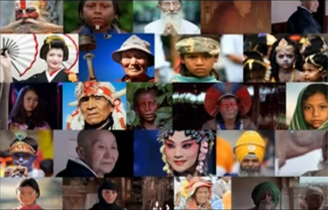UNESCO assembles peoples around transnational traditions like couscous, one of 32 new inscriptions on its Intangible Heritage Lists
United Arab Emirates, Oman - Camel racing, a social practice and a festive heritage associated with camels. Camel racing, a social practice and festive heritage associated with camels is popular in the communities concerned. Camels are selected based on type, origin and age, given a special diet and trained to take part in the races. The racing, usually involving 15 to 20 camels per round, is conducted in specially designed fields. Related knowledge and skills are acquired through observation, simulation and oral expressions and the importance of camel racing in Bedouin society is connected to the prominent role camels play in the desert environment.
Zambia - Budima dance. The Budima Dance is a warrior dance performed all year round by the Wee people on various spiritual and sombre occasions. The dance includes men, women and children. The men represent skilled soldiers or fighters who mimic war with long spears, while others blow the sets of one-note antelope horn flutes/trumpets and shout chants. The women sing along and dance energetically wearing beaded jewellery and rattles on their feet,. The Budima Dance serves as a unifying practice for the communities concerned, who take great pride in the dance.
Algeria, Mauritania, Morocco, Tunisia — Knowledge, know-how and practices pertaining to the production and consumption of couscous. The knowledge, know-how and practices pertaining to the production and consumption of couscous encompass the methods of production, manufacturing conditions and tools, associated artefacts and circumstances of couscous consumption in the communities concerned. Preparing couscous is a ceremonial process involving different operations and is associated with a set of exclusive tools. Accompanied by a variety of vegetables and meats depending on the region, season and occasion, the dish is replete with symbols, meanings and social and cultural dimensions linked to solidarity, conviviality and the sharing of meals.
Argentina - Chamamé. Chamamé is a form of cultural expression that is mainly practised in Corrientes province. Key elements include a style of ‘close embrace’ dancing, musiqueada social events, and sapukay, a typical cry accompanied by movements to convey emotions. The singing involved has its roots in religious songs. Originally, Chamamé was sung in Guarani, but it is now transmitted in a combination of Spanish and Guarani. Chamamé music and dancing are common features in community and family gatherings, religious celebrations, and other festive events.
Azerbaijan - Nar Bayrami, traditional pomegranate festivity and culture. Nar Bayrami is an annual festival in October/November in Azerbaijan’s Goychay region that celebrates the pomegranate and its centuries-old traditional uses and symbolic meaning. Pomegranate culture encompasses practices, knowledge, traditions and skills related to the cultivation of the fruit, which is used not only in a range of culinary preparations, but is also featured in crafts, decorative arts, myths, storytelling, and other creative expressions. The festival highlights local nature and culture celebrating the pomegranate’s practical and symbolic importance.
Azerbaijan, Iran (Islamic Republic of), Turkey, Uzbekistan - Art of miniature. The miniature is a type of artwork that involves the design and creation of small paintings in books, rugs, textiles, ceramics, and other supports using raw materials such as gold, silver, and various organic dyes. Historically miniature paintings were chiefly produced as book illustrations, but the practice has evolved and can now also be found in architecture and as an adornment in public spaces. It is a traditional craft typically transmitted through mentor-apprentice relationships and is an integral part of societies’ social and cultural identity.
Bosnia and Herzegovina - Grass mowing competition custom in Kupres. The annual mowing competition that takes place in July at a specific meadow called Strljanica is the most important social event in the Kupres municipality. The contest involves the manual mowing of grass using a scythe and is judged by the time, effort, and amount mown as cutting grass at that altitude requires strength and a special technique. Traditionally, the competitors are men aged 18 and above. The practice is transmitted within families from father to son.
China - Taijiquan. Taijiquan is a traditional physical practice characterized by relaxed, circular movements in concert with breath regulation and cultivation of a righteous and neutral mind. Originating during the mid-17th century in Henan Province in central China, the practice has spread to the rest of the country and is followed by a wide array of people. Influenced by Daoist and Confucian thought and traditional Chinese medicine, the element has developed into several schools (or styles) named after a clan or a master.
China, Malaysia - Ong Chun/Wangchuan/Wangkang ceremony, rituals and related practices for maintaining the sustainable connection between man and the ocean. The Ong Chun ceremony and related practices is rooted in folk customs of worshipping Ong Yah, a deity believed to protect people and their lands from disaster. The element is centered in coastal communities in China’s Minnan region and in Melaka, Malaysia. The ceremony includes welcoming Ong Yah to temples or clan halls, delivering ‘good brothers’ (people lost at sea) from torment, and honouring the connection between people and the ocean. Performances during the procession feature different types of dancing.
Czechia - Handmade production of Christmas tree decorations from blown glass beads. The handmade production of Christmas tree decorations from blown glass beads, uses beads that are silvered, coloured and decorated by hand. Considered a key cultural element of the Giant and Jizera Mountain regions of North Bohemia, the traditional craft has been passed down through families for generations. It is also safeguarded by the Kulhavý family workshop, the only small production workshop to have survived economic transformation. The creation of Christmas ornaments such as these appear in folk tales about Krakonoš, the legendary ruler of the mountains.
Address: 81, Laiguangying West Road, Chaoyang District, Beijing, China
Zip Code: 100021
Tel: 86-10-64966526
Fax: 86-10-64969281
E-mail: administration@crihap.cn
NEWSLETTER
Leave us your e-mail address, we'll let you know about current events.


